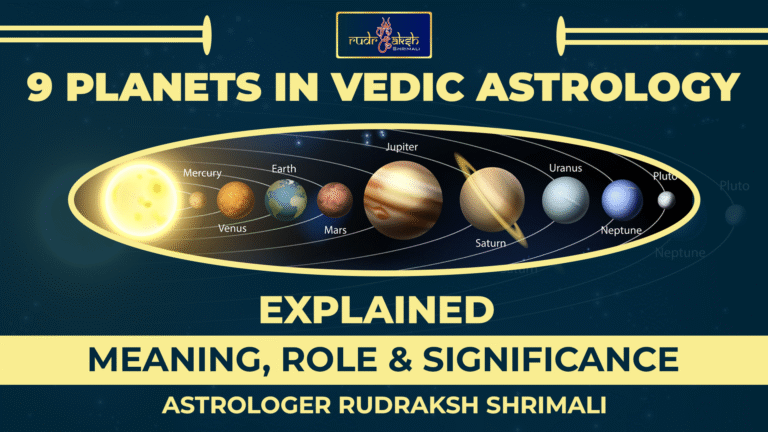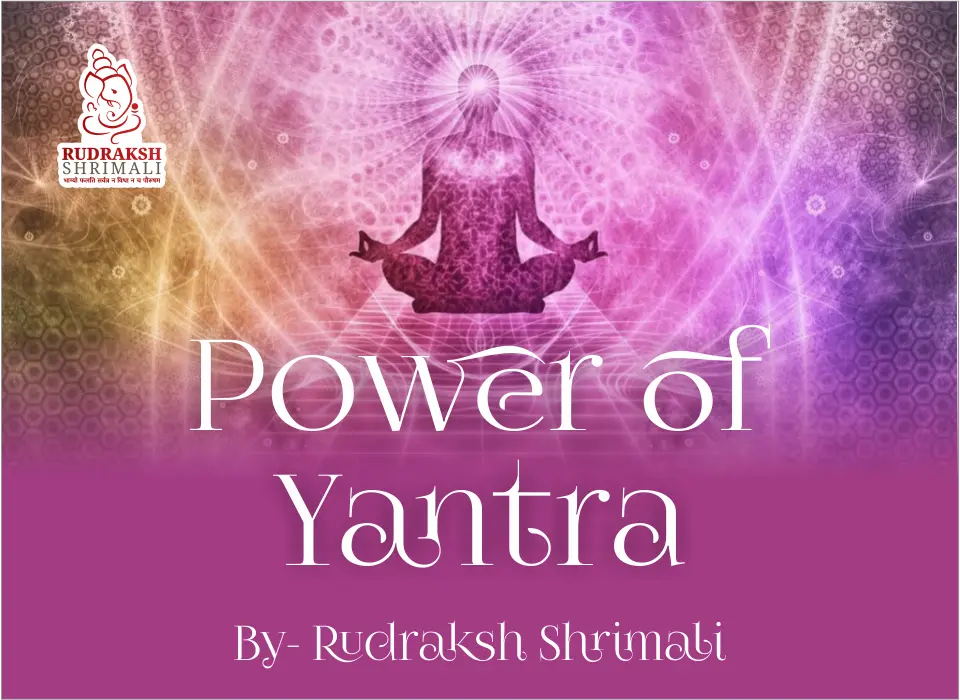Vedic astrology is an Indian system which has been practiced over centuries, that explains heavenly positions to understand and predict the events of human life. At the heart of this astrological structure there are 9 planets, known as the Navagraha in astrology. These planets are considered to shape luck, behaviour, health, career, and karma. But what are these astronomical effects really?
In astrology, 9 planets, also known as Navagraha, play an important role in shaping our lives. Each planet affects different aspects such as health, emotions, careers, and relationships. In this blog, Astrologer Rudraksh Shrimali, a well -known Vedic astrologer in Delhi, simplifies the significance and effects of these astronomical powers. Shrimali Ji is a 4th generation astrologer, and he uses this generational knowledge to provide a clear and practical perspective on how you can influence your destiny in Vedic astrology.
What Are the 9 Planets in Vedic Astrology?
Astrology includes seven physical astronomical bodies and two shade planets in 9 planets. These are:
Although Rahu and Ketu are not physical planets, they play an important role in Vedic astrology because of their acute karma effects.
The Role of Planets in Vedic Astrology
Each planet controls specific aspects of life – emotions, intellect, courage, relationships, and spirituality. The location of these planets at the time of someone’s birth makes a unique astrological blueprint or birth chart, also known as Kundli.
Each planet lives in a zodiac sign and home, its position (strong or weak), placements, combinations, and its effects, depends on the significance of zodiac signs in which they are placed. This broad conversation explains the importance of planets in astrology.
Surya (Sun) – The Soul and Authority
Surya, or sun, represents the soul, vitality, leadership, and ego. This planet controls the sign of Leo. A strong sun provides confidence, and high position, while a plagued sun can result in ego, health problems and poor self-image. In Vedic astrology, the sun is a royal planet that sets tone for a person’s identity and purpose.
Chandra (Moon) – The Mind and Emotions
Moon is a symbol of emotions, and mind. It prevails over Cancer and is associated with mental peace. Moon placement affects emotions, and creativity. A favourable moon ensures mercy and security, while a masculinist leads to anxiety, mood, or depression.
Mangal (Mars) – Energy and Action
Mars is the planet of courage, physical strength, and ambitions. It controls Aries and Scorpio, a symbol of driving force, discipline, and claim. When he is strong, Mars provides enthusiasm, leadership, and success in competing areas. However, if unfavourable, it can cause aggression, impulses and even violence. Mangal has played an important role in Navgraha in astrology, especially to determine marital harmony (manglik dosh).
Budh (Mercury) – Intellect and Communication
Mercury controls intelligence, speech, logic, and business. It controls Gemini and Virgo and is associated with learning, trade, and intelligence. A well -placed mercury improves analytical skills, eloquence, and adaptability. A weak or retrograde mercury can cause confusion, or nervousness. Its duality and sharpness are reflected in its abnormal nature – an identity in understanding the importance of astrology planets.
Guru (Jupiter) – Wisdom and Expansion
Jupiter is a teacher among the planets, which represents knowledge, spiritual development, morality, and destiny. It controls the Sagittarius and Pisces and is considered the most advantageous planet.
A strong Jupiter ensures wealth, knowledge, morality, and generosity. Jupiter’s influence in Vedic astrology controls education, and agriculture.
Shukra (Venus) – Beauty and Love
Venus is the planet of love, joy, art, luxury, and relationship. It controls Taurus and Libra. When strong, Venus improves beauty, attraction, romance, and physical comfort. When its unfavourable to a person, can give rise to pride, it can affect the sexual health and sexual relations, or it can deprive people’s luxury.
Shani (Saturn) – Discipline and Karma
Shani, second name of Karma, is the task master, who brings discipline, structure, delay and responsibilities. It controls the Capricorn and Aquarius and is concerned about its slow influential nature.
A powerful Saturn learns patience, flexibility, and maturity. A weak Saturn causes depression, fear, and difficultyin life. During Saturn’s (Shani) Sade Sati and Dhaiya period, people face many difficulties like slow growth in work. Even with their full efforts people do not see any positive changes.
Rahu – Obsession and Worldly Desire
Rahu, North Node, is a shadow planet known for passion, materialism, and unconventional behaviour. It does not control any sign but is exaggerated in the Taurus and is weak in the Scorpion.
Rahu’s effect is intense – it increases wishes, ambitions, and deception. While it suddenly brings success, it also causes confusion, addiction, or social fraud. Understanding Rahu is important to explain the planets.
Influence of Planets in Vedic Astrology
The effect of each planet in Vedic astrology depends on its sign, home agreement, aspects, and strength, transit (transport), planetary periods (dasha).
For example:
These interpretations reveal the deep importance of planets in astrology. When it comes to understanding the importance of planets in astrology, Rudraksh Shrimali stands out as one of the best astrologers in Delhi. His expertise in decoding the effect of planets in Vedic astrology has helped countless individuals find clarity and direction. Whether it is a strong role as Mars in ambition or Jupiter’s quiet knowledge in education, Shrimali Ji has mastered it unparalleled.
In Vedic astrology, 9 planets are not only moving astronomical objects, but are deeply associated with our karma -yatra. From shaping our personality to influencing our careers and relationships, these planets lead all aspects of life.
If you want to understand how 9 planets in astrology affect your personal journey, you can contact Astrologer Rudraksh Shrimali – a top astrologer in Delhi, known for his accurate reading and real guidance. As a well-known astrologer and one of the most respected astrological experts in Delhi NCR, their consultations provide practical solutions based on a detailed study of planets. Search your true path with one of the most reliable astrologers of India.
By understanding the role of the planets in Vedic astrology, anyone can navigate challenges with consciousness and can find the right path in life. The importance of astrological planets is ultimately a roadmap.
👉 Learn more about Astrologer Rudraksh Shrimali



